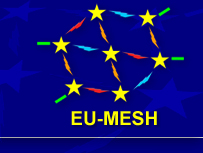|
The EU-MESH project will develop, evaluate, and trial a system of software modules for building secure and dependable wireless multi-radio multi-channel mesh networks with QoS support. To achieve this goal, the work plan involves the following phases: identification of requirements; architecture design; research and development activities for mesh configuration and link control, resource management, QoS routing, mobility, and security; integration; and finally experiments and trials.
The work plan is divided into the following seven work packages:
- WP1 - Project Management and Assessment
- WP2 - Requirements and Architecture
- WP3 - Mesh Configuration and Link Control
- WP4 - Resource, QoS, and Mobility Management
- WP5 - Security
- WP6 - Experiments and Trials
- WP7 - Dissemination, Standardisation, and Exploitation
To ensure an innovative and effective contribution, the architecture design work package (WP2) will receive continuous feedback from the software modules’ design/validation/trial phases, as well as feedback from relevant standardisation activities. Based on this feedback, WP2 will adapt/modify and align, as necessary, the EU-MESH system architecture.
The implementation of the software modules will be performed within each of the three main research and development work packages (WP3-WP5). This allows a tighter feedback and iteration between the development and the implementation/validation phases, as well as a controlled interaction and alignment of the three main work areas. The implementation will follow an incremental procedure, where we first develop/validate local mechanisms, and then test the functionality involving communication between neighbouring Mesh Routers (MRs) and end-to-end communication. Implementation will be based on open software platforms (Linux, FreeBSD, etc) but also special development platforms, in order to exploit existing code and minimize the time needed to realize a functioning prototype; this will help to test the implementations as early as possible. The validation of the developed modules will be performed using simulation and controlled test-bed experimentation.
WP6 includes system integration, and the planning and execution of experiments and trials. The experiments and trials will qualitatively and quantitatively assess the performance gains of the procedures and algorithms, but will also prove the viability of the EU-MESH technology to offer a potential economic advantage.
|



